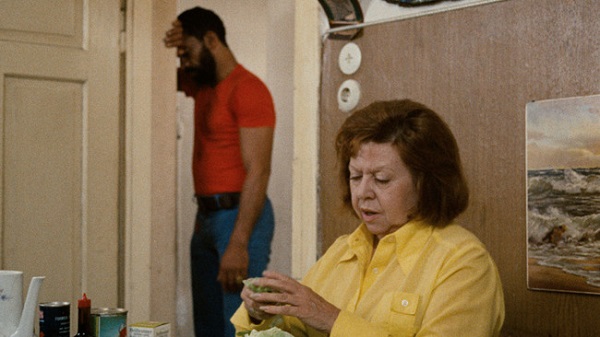
Many critics have marveled about Rainer Werner Fassbinder’s output, and other have written about the content of his work. The latter, is, obviously, more interesting. He started out as someone interested in depicting amorality, putting a German twist on Hollywood tropes. But he eventually branched out to depicting acts and relationships that his society deems amoral. He asks his audiences to have empathy for his characters, most of whom he obviously bases on himself. His early death is also a warning to others to slow down. It also means that he cannot defend himself from valid modern criticism.
Most of his early work was a tribute to the trashier examples of New Wave. One of those is Love is Colder than Death, where where the protagonist is a sex worker (Hanna Schygulla). Here he lets scenes settle, using an earlier and more macho version of the male gaze. Characters are complicit in criminal acts, besting themselves at being the worst. He ends this film in a shocking manner. Modern viewers can interpret that now to show how some people can get away with literal murder.
His characters eventually get more sympathetic, like the ones in Ali: Fear Eats Soul. This time around, one half of the central couple is a German or Polish woman (Brigitte Mira). And the other is the titular Northern African man (El Hedi ben Salem). Fassbinder’s gaze on him, in the beginning, feels problematically fetishistic, but he eventually brings his camera closer on Ali. He uses those close-ups on his encounters with the racism around him. Even with visual constraints he refuses to be passive. He proves himself to be an intelligent man who unfortunately surrounds himself with people too obtuse to see his potential.
Some of his films are about social hindrances. But characters in his other films feel the highs and the lows of success. The titular character in The Marriage of Maria Braun (Schygulla) feels that roller coaster life. She could have been happy either as a mistress of a black GI. Or as an interpreter between American and German businessmen. But she always returns to her ex-SS of a husband (Klaus Lowitsch). His camera movements flow more freely here as he explores some problematic equivalences. America, black or white, is a promise of progress while Germany represents a metastasizing past.
The past works as a chaotic ghost in Fassbinder’s films, even in conventional ones like Veronika Voss. Half of it is about the titular actress (Rosel Zech). Fassbinder bases her on actress Sybille Schmidt, an ex-Nazi collaborator with a drug addiction. But the film’s other half belongs to the man she seduces. That man is Robert Krohn (Hilmer Thate), a sportswriter who must clean up her occasional messes. Robert has the same spirit as Fassbinder’s other romantic male leads. He has a ‘screw it’ attitude that gets them in entanglements. They have the love and devotion that Fassbinder demands from himself and others.
Sometimes, the love stories in Fassbinder’s films are two way. And in others, one party has more love than the other. He made four films in 1975 including Fox and His Friends, where he Franz Biberkopf. A lottery addict, Franz finally hits the jackpot. He then loans his winnings to his lover and the latter’s family printing business. Unconventional human behavior shows up all the time in his films. Here is where one of the most memorable and awkward interpersonal encounters happen. Because here is when Franz has a sneezing attack during financial negotiations. Strange bodily functions surface, like allergic reactions to bourgeois nonsense.
But not all the character interactions in Fassbinder’s works are awkward. Eight Hours Don’t Make A Day is one of his miniseries, depicting house parties, mess halls, and even communal showers. Those are unconventional places that protagonist Jochen Epp (Gottfried John) occupies with other characters. There, he starts awkward but necessary discussions on how to make life better for himself, his family, and his coworkers. Another way of explaining this to someone watching it might paint bad picture of Germany. A country of disgruntled workers who must pay high rent. Those were problems in the 1920s as they were in the 1970s, the series’ setting. It is as if the then West Germany has not learned anything, but they are trying. There is, after all, an e-plot where Jochen’s girlfriend’s (Schygulla) co-worker (Irm Hermann, RIP). That character unlearns her prejudice against working class men.
There is a lot to learn from Fassbinder’s work, an imperfect man trying to impart lessons to a flawed society. Nobody is perfect, but that also depends on how much imperfection society is willing to tolerate, especially as time passes. He was a controversial figure then and now. His work received valid criticism from both sides of the political spectrum. There also have been whispers that he mentally and physically abused his actors. Letting him disappear from the canon is a sacrifice film lovers can make. But there’s hope that they don’t have to cross that bridge.
And for those who dare, Directed by Rainer Werner Fassbinder is available on the Criterion Channel.



